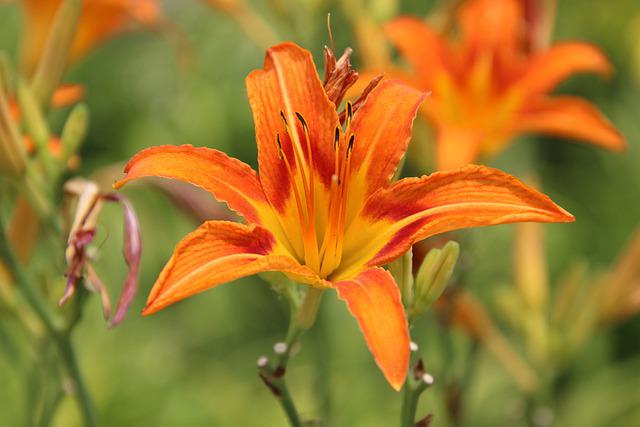As I traveled through Iowa, I came across a massive bed of ditch lilies in bloom. The bright orange flowers on tall spikes were spectacular. It reminded me of my childhood on my grandparent’s farm. Ditch lilies filled large spaces on nineteenth-century farmsteads and roadsides. They are easy to grow and, once established, almost impossible to kill. Their tubers spread quickly through the soil, compacting, and choking out weeds and other native plants.

Why would you want to plant ditch lilies if they are so aggressive? Ditch lilies are planted in areas to hold back soil to prevent further erosion and hide unattractive spaces that are offensive to the sense of beauty.
Their botanical name is Hemerocallis fulva, but they are better known as ditch lilies, railroad lilies, tiger lilies, outhouse lilies, and wash-house lilies. This herbaceous perennial may have diploid or triploid flowers in the wild, but most cultivated plants are sterile triploids. Their flowers may be sterile, but their tubers are aggressive. They are native to Asia but are home in any temperate climate. Although ditch lilies, genus Hemerocallis, are not related to true lilies, genus Lilium, their name is attained from the similarity of the flower’s morphology. Like other daylilies, their flower lasts only one day, with each flower opening in sequence. Ditch lilies, unlike hybrid daylilies, may have as many as twenty buds on a single stem. The dense display of orange begins in early summer and ends in late autumn.
Ditch lilies, like some other daylilies, are edible. For centuries, Chinese cuisine has used Hemerocallis in dishes like Moo Shu Pork and Hot and Sour Soup. According to Hank Shaw, American chef and outdoorsman, ditch lilies are delectable. He has sautéed the flowers, buds, stems, and tubers in butter. Unopened flower buds “pop” when sautéed, and tubers are just as tasty. Hank exclaimed that they taste like jicama! But remember, he is eating Hemerocallis and not Lilium. Lilium has alkaloids that will make you sick. Also, if you are foraging for ditch lilies, remember that farmers and the state or county departments in charge of road maintenance use chemicals that may also make you sick. Be cautious!

There are several ways to eradicate ditch lilies that have aggressively moved into their neighbors’ beds. You may dig ditch lilies out by hand, making sure that every root and tuber has been removed. You can smother them by mowing the lilies down and covering them with thick, wet newspapers and at least six inches of mulch. Or you can carefully apply an herbicide directly on the lily. Check with your local garden shop or your county extension service about the proper chemicals and directions to use.
National Garden Clubs, Inc. is a 501(c)(3) organization that aims to promote the love of gardening, floral design, and civic and environmental responsibility. There is a local club near you, click here to find one and join. Subscribe to the NGC’s blog by entering your e-mail here. You do not have to be an NGC member to subscribe. NGC welcomes blog article submissions, e-mail the Blog Administrator at blog@gardenclub.org.
2 Comments
Kansas Gardener Editor
I enjoyed reading about these lilies. There were things which I did not know. Thank you .
Gardener
These are beautiful and I may give them a try. I bet my Moose would love them.

 Board Member Login
Board Member Login Our Store
Our Store Blog
Blog





